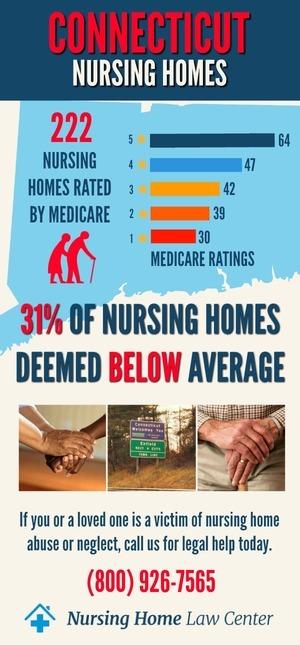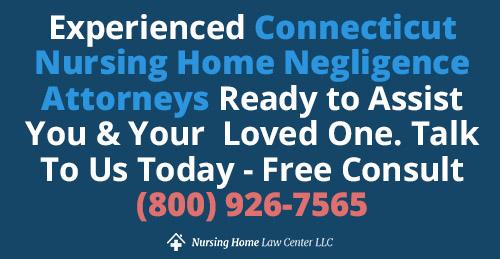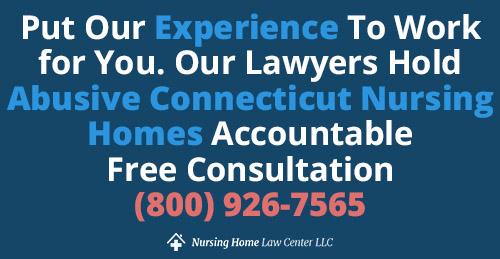The Nursing Home Law Center is committed to providing the legal resources necessary to hold negligent facilities accountable.
Connecticut Nursing Home Abuse Lawyer

Licensed in Connecticut
Nursing home abuse is a deeply troubling issue that affects many elderly residents in Connecticut nursing homes and assisted living facilities. Vulnerable residents are often subjected to various forms of mistreatment, which can have severe physical, mental, and emotional consequences.
For families, discovering that their loved one has become a victim of nursing home abuse can be devastating. It’s essential to seek legal help from an experienced Connecticut nursing home negligence attorney to hold the offending parties accountable and ensure the abuse victim receives the financial compensation they deserve.
Why Hire Nursing Home Law Center
At Nursing Home Law Center, we seek justice and fair compensation for victims of nursing home negligence. Our experienced legal firm has a strong history of handling these complex cases carefully and securing substantial settlements and verdicts for our clients.
We carry out detailed investigations to ensure that every aspect of the abuse, including medical expenses, emotional trauma, and other damages, is fully addressed. With our extensive knowledge of nursing home neglect claims, we skillfully manage the legal process and fight relentlessly to protect your rights.
From start to finish, a nursing home negligence lawyer will offer compassionate guidance and maintain clear communication, ensuring you and your loved ones remain informed, supported, and confident throughout the legal journey.
Types of Cases Handled by Our Connecticut Lawyers
Nursing home abuse refers to the mistreatment or neglect of residents, often resulting in severe harm or even death. This abuse can occur in various forms, from physical violence to emotional manipulation, and it significantly impacts the health and well-being of elderly individuals.
Our Connecticut personal injury attorneys are experienced in handling a wide range of abuse and neglect cases to ensure victims receive justice and financial compensation.
Physical Abuse
This abuse involves any form of physical harm inflicted on an elderly person at the facility, including hitting, slapping, or pushing. It may involve the improper use of physical restraints, leading to broken bones, bruises, or other unexplained injuries.
Mental and Emotional Abuse
Mental and emotional abuse occurs when residents are verbally abused, threatened, or intimidated by nursing home staff members. This form of abuse can cause severe psychological harm, leading to depression, anxiety, and fear.
Sexual Abuse
Sexual abuse in nursing homes involves any unwanted sexual contact or exploitation of a resident. Signs of sexual abuse may include bruising in sensitive areas, unexplained infections, or sudden changes in behavior.
Medical Malpractice
Medical malpractice occurs when residents do not receive the necessary medical care. This can include the development of bed sores (pressure ulcers) due to neglect, administering incorrect medications, or failing to treat a resident’s medical condition properly.
Negligence
Nursing home negligence occurs when a facility, such as an assisted living center, fails to provide the minimum standard of care required by federal regulations and Connecticut laws. Examples include poor hygiene, malnutrition, dehydration, and elopement, where a resident wanders off unsupervised.
Financial Abuse
Financial abuse involves the exploitation of a resident’s financial resources, such as unauthorized withdrawals, identity theft, or manipulation of legal documents.
Wrongful Death
When elder abuse or nursing home negligence leads to the death of a resident, it constitutes wrongful death. Family members have the right to pursue legal action and fair compensation for the loss of their loved one. Our Connecticut personal injury attorneys are committed to representing families in these tragic cases and seeking justice for their loss.
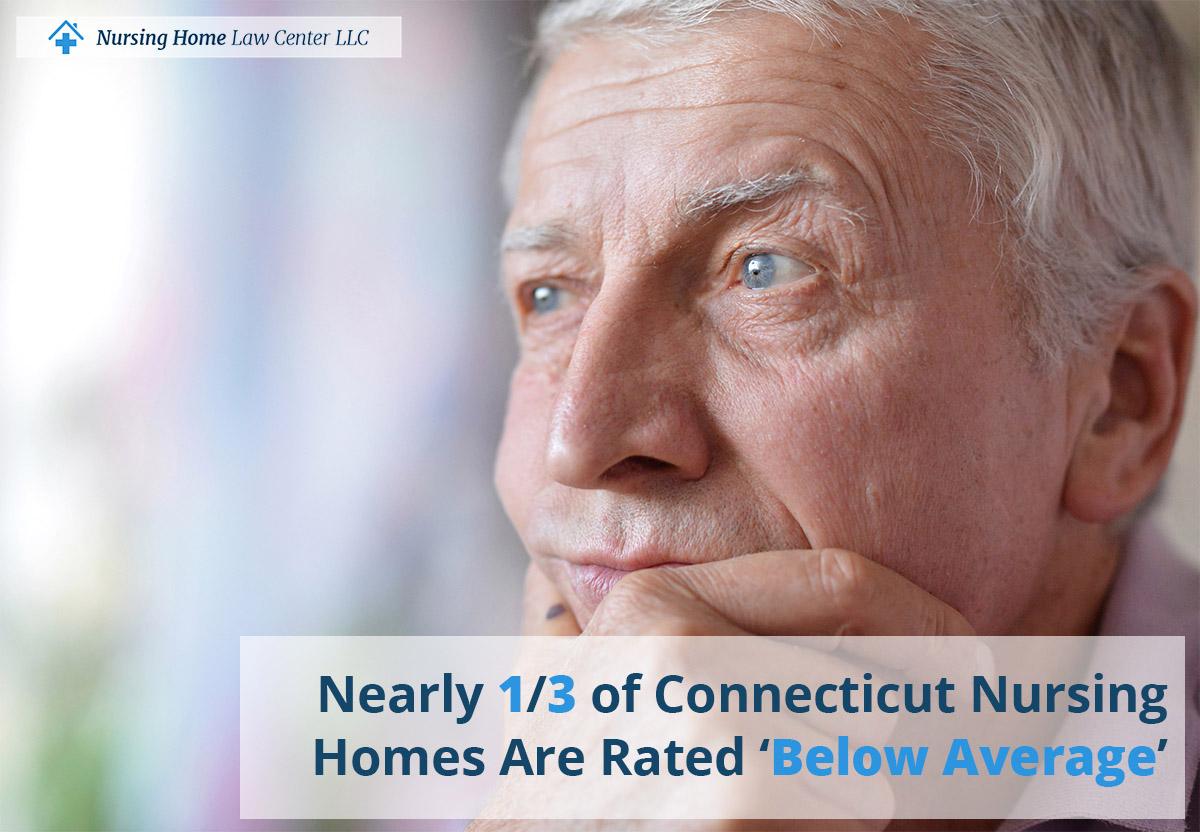
Understanding Your Legal Rights
Residents are entitled to specific protections that ensure their safety, dignity, and well-being.
One key federal law protecting residents is the Nursing Home Reform Act of 1987. This law sets out a series of protections to ensure residents receive proper medical care, live in a safe environment, and are free from abuse and neglect.
The act requires nursing homes to provide services that maintain or improve each resident’s quality of life, including ensuring their physical and mental well-being. Facilities that fail to meet these standards can be held accountable for violating residents’ rights.
In addition to federal protections, Connecticut law offers its own set of safeguards for residents. The Connecticut Department of Public Health enforces regulations that ensure care facilities meet minimum staffing requirements, provide appropriate medical treatment, and maintain a standard of care that prevents harm to residents.
Connecticut nursing homes are subject to regular inspections and must comply with state laws that protect residents from abuse, neglect, and financial exploitation.
Eligibility to File a Claim
Several parties can file a legal claim in cases of nursing home negligence or abuse:
- The resident: If the nursing home resident is mentally and physically capable, they can file a claim on their behalf for any mistreatment, neglect, or injuries they have suffered.
- Family members or legal guardians: If the resident cannot pursue legal action due to incapacity or illness, a family member or legal guardian can file a claim on their behalf.
- Estate representatives: In tragic cases where abuse or neglect results in the death of a resident, the personal representative of the resident’s estate can file a wrongful death claim.
Liability in Nursing Home Neglect and Abuse Cases
In these cases, multiple parties may be held liable for the harm caused to residents, such as:
- Nursing home facility
- Individual caregivers and staff members
- Nursing home management
- Third-party contractors
- Medical professionals
How Our Connecticut Nursing Home Abuse Attorneys Can Help

At Nursing Home Law Center, our team of Connecticut nursing home abuse attorneys has extensive experience representing victims of abuse and neglect in nursing homes and assisted living facilities.
Free Case Evaluation
We begin by offering a free consultation to review your case. During this evaluation, our attorneys will assess the details of your situation, explain your legal options, and advise you on the next steps.
Case Investigation
Our legal team conducts thorough case investigations to gather all the necessary evidence to support your claim. This includes reviewing medical records, interviewing staff members, and identifying signs of nursing home negligence, such as poor hygiene, bed sores, or unexplained injuries.
Filing the Claim
Once the investigation is complete, we will file the claim on your behalf. This involves preparing the required legal documents, adhering to strict deadlines, and ensuring the claim is filed in the appropriate court. Our attorneys have extensive knowledge of Connecticut laws and federal nursing home care regulations, ensuring your claim is handled with expertise and precision.
Settlement Negotiation
Many nursing home abuse cases are resolved through settlement negotiations, where the parties agree to compensation without going to trial. Our attorneys are skilled negotiators who will fight to ensure you receive fair compensation for medical expenses, emotional distress, and other damages.
Trial Representation
Our attorneys are fully prepared to take your case to court if a settlement cannot be reached. We have extensive experience in trial representation and will advocate fiercely on your behalf to ensure justice is served.
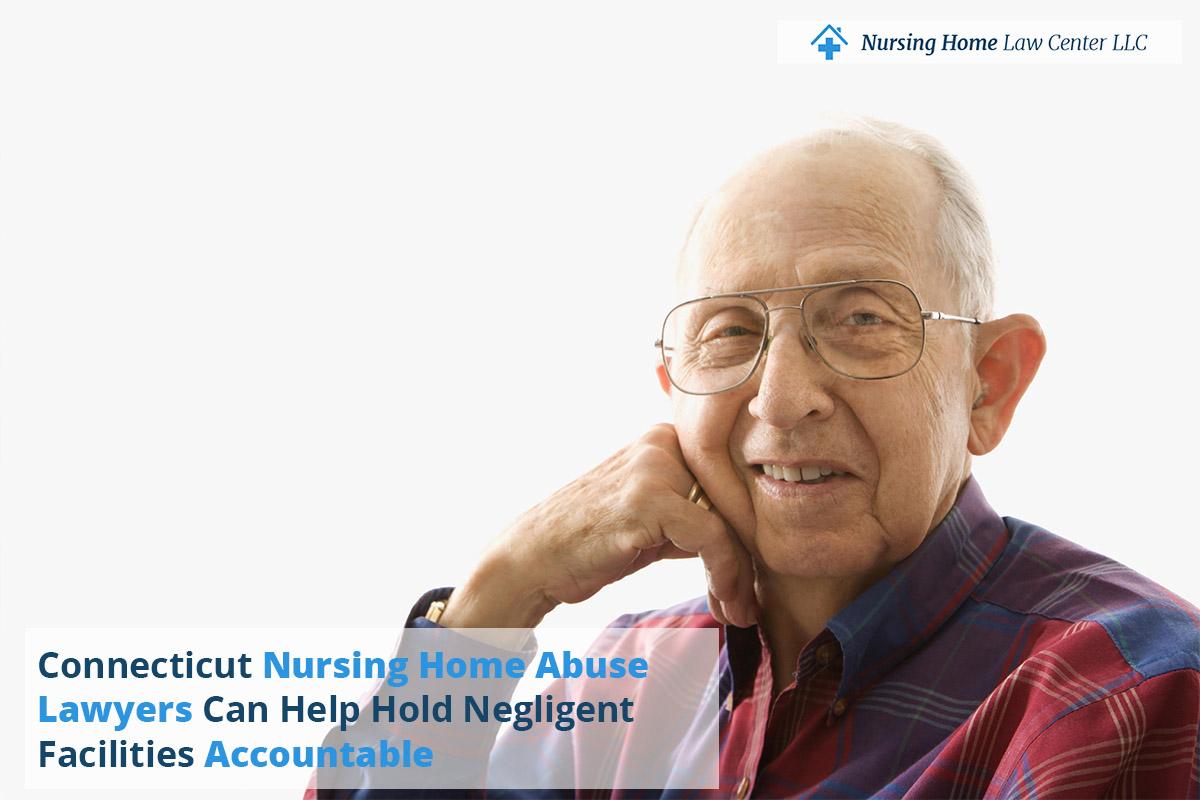
Common Signs of Elder Abuse Among Nursing Home Residents
In Connecticut, there are a total of 194 Medicare-certified nursing home facilities.
Seventy-nine of these facilities (40.7%) received an overall score of “below average” or “much below average.” Specifically, 84 nursing homes (43.3%) fall short in health inspections, and 54 facilities (27.8%) have inadequate staffing. Fifty-five nursing homes (28.4%) rated poorly on quality measures. [1]
Recognizing the warning signs is critical in protecting vulnerable residents and ensuring they receive the proper care they deserve.
- Burns, cuts, or broken bones that cannot be reasonably explained
- Bruises or abrasions around wrists or ankles
- Frequent hospital visits
- Behavioral changes
- Depression or anxiety
- Sudden withdrawal from social activities
- Fear of caregivers
- Bruising, bleeding, or infections in sensitive areas
- Bed sores (pressure ulcers)
- Unsanitary living conditions
- Poor personal hygiene
- Malnutrition and dehydration
- Unexplained financial transactions
- Sudden changes to wills, power of attorney, or other financial documents
The worst-rated nursing homes in Connecticut include:
| Abbott Terrace Health Center | Apple Rehab Cromwell |
| Apple Rehab Farmington Valley | Apple Rehab Laurel Woods |
| Apple Rehab Rocky Hill | Apple Rehab Saybrook |
| Apple Rehab Shelton Lakes | Apple Rehab Uncasville |
| Apple Rehab West Haven | Arden Care Center |
| Autumn Lake Healthcare at Madison | Autumn Lake Healthcare at West Hartford |
| Bayview Health Care | Beacon Brook Center for Health & Rehabilitation |
| Carolton Chronic & Conv Hospital | Cassena Care at Norwalk |
| Civita Care Center at Danbury | Civita Care Center at Milford |
| Complete Care at Fox Hill | Complete Care at Kimberly Hall North |
| Greentree Manor Nursing and Rehabilitation Center | Hewitt Health & Rehabilitation Center, Inc |
| Laurel Ridge Health Care Center | Litchfield Woods Health Care Center |
| Marlborough Health & Rehabilitation Center | Meriden Health and Rehab |
| Montowese Center for Health & Rehabilitation | New Haven Center for Nursing & Rehabilitation LLC |
| Noble Horizons | Northbridge Health Care Center |
| Riverside Health & Rehabilitation | Saint John Paul II Center |
| Salmon Brook Rehab and Nursing | Shady Knoll |
| Sharon Center for Health & Rehabilitation | Skyview Rehab and Nursing |
| Southport Center for Nursing & Rehabilitation LLC | St Joseph’s Center |
| Stone Bridge Center for Health & Rehabilitation | Summit at Plantsville, The |
| Valerie Manor | Vanderman Place |
| Villa Maria Nursing and Rehabilitation Community | Wadsworth Glen Health Care and Rehabilitation Cent |
| West Haven Center for Nursing & Rehabilitation | Wolcott Hall Nursing Center Inc |
What to Do If You Suspect Nursing Home Abuse
If you suspect that your elderly loved one is being mistreated in an assisted living facility, it’s essential to act quickly to ensure their safety:
- Contact a Nursing Home Negligence Lawyer: A qualified Connecticut nursing home negligence attorney can guide you through the legal process, conduct an investigation, and help you pursue financial compensation for the harm caused.
- Call 911 if Immediate Danger is Present: Emergency responders can provide medical assistance and help remove your loved one from a dangerous situation.
- Report to Assisted Living Facility Administrator or Management: They must investigate and take appropriate action to address the situation. Document all communications with management, including your reports’ date, time, and content.
- File a Complaint with Your Local Ombudsman’s Office: Filing a complaint with your local Ombudsman ensures that an impartial third party investigates the abuse and takes steps to protect your elderly loved one’s rights.
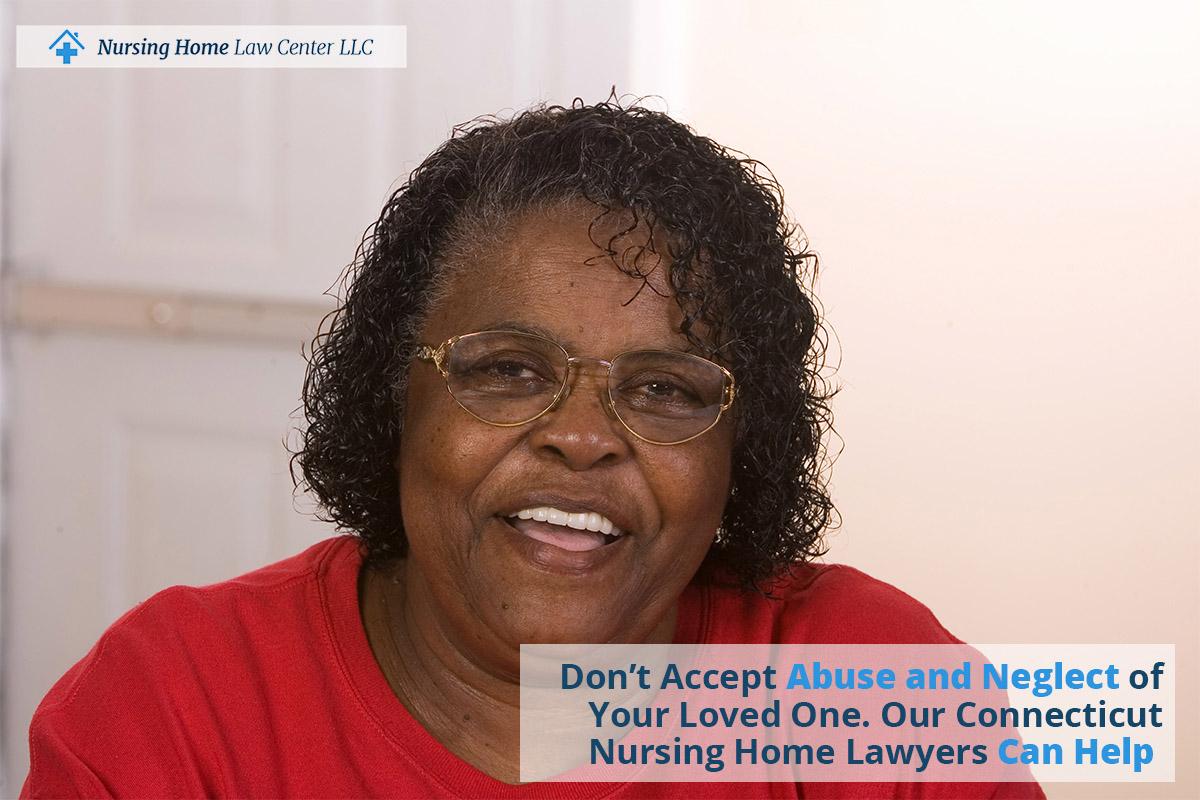
Damages You Can Recover Through a Nursing Home Abuse Claim
Filing a claim allows victims and their families to pursue compensation for the harm suffered.
Economic Damages
Economic damages are intended to compensate for the financial losses associated with the abuse or neglect. Examples include:
- Medical expenses
- Rehabilitation costs
- Relocation expenses
Non-Economic Damages
Non-economic damages compensate for the psychological impact of the abuse or neglect. Examples include:
- Pain and suffering
- Emotional distress
- Loss of quality of life
Punitive Damages
Punitive damages are awarded in cases where the nursing home’s conduct was particularly egregious or reckless. These damages are not intended to compensate the victim but to punish the responsible parties and deter future misconduct.
Wrongful Death Damages
If elder abuse or nursing home negligence leads to the death of a nursing home resident, family members can file a claim. Damages recoverable in this lawsuit include:
- Funeral and burial expenses
- Loss of companionship
- Loss of financial support

You Have Limited Time to Take Legal Action in Connecticut
The statute of limitations in Connecticut is two years from the date the abuse or neglect occurred or when it was reasonably discovered. In cases of death resulting from elder abuse or nursing home negligence, the two-year period typically begins from the date of the victim’s death.
Contact a Connecticut Nursing Home Abuse Attorney Today!
At Nursing Home Law Center, our experienced team of Connecticut nursing home abuse attorneys is dedicated to representing victims of abuse and neglect in assisted living facilities. With a proven track record of success, we have helped countless families secure justice and fair compensation for the harm their loved ones have suffered.
Contact a nursing home negligence lawyer to schedule your free consultation and take the first step toward protecting your elderly loved one’s rights.
Call our law firm at (800) 926-7565 or fill out our contact form to secure expert legal counsel.
References: [1] Medicare


